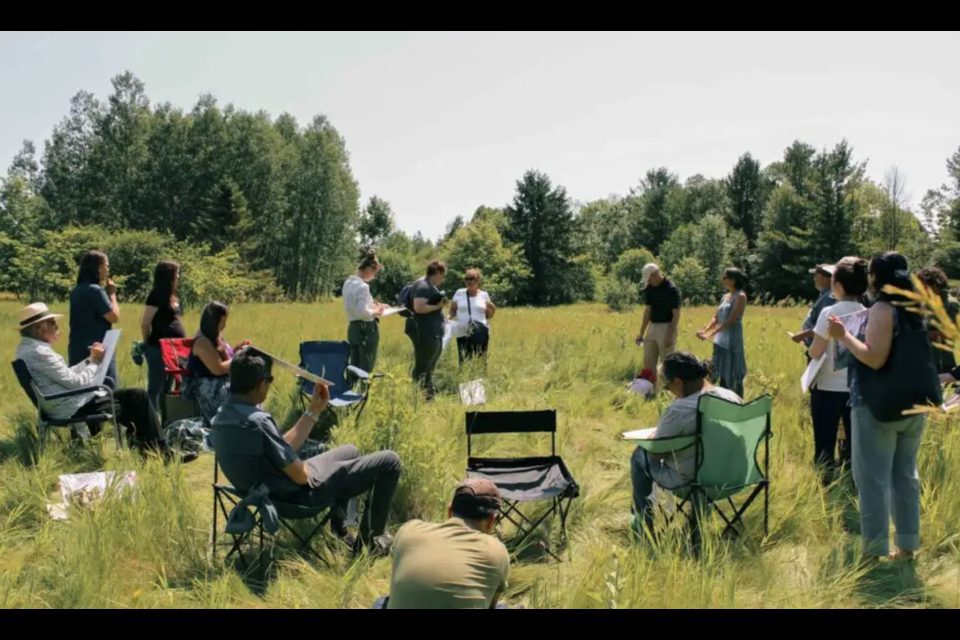University of Guelph is changing the way its approach to Indigenous studies by creating a space where students feel right at home, literally.
Early next year, U of G will begin constructing a 1,700-square-foot lab in a section of the Arboretum, surrounded by trees and other plants called Nokom’s House research laboratory.
But this isn’t just any lab, it's a lab for Indigenous studies that is meant to feel like a grandmother’s home where students feel welcome, nurtured and safe. It's meant to be a place where they gather, create and take part in ceremonies.
The word “Nokom” comes from the Ojibway word “nokomis” which means grandmother.
“A lot of us find grandmother and grandmother spaces where we get trained and trained to do the work that we do,” said Kim Anderson, who is Métis and a professor in the department of family relations and applied nutrition.
She said relationship building will be at the heart of the project and students will be able to build relationships with the community through language, ceremonies, food, storytelling and animals around them.
While the design of the building and its surrounding space are in the early development stage, the cabin is said to have a meeting room, a kitchen, a consultation room, a wood stove, a garden outside, an area for sacred fires and structures for informal teaching.
Anderson came up with the idea for the lab and swiftly brought professors Sheri Longboat, a Haudenosaunee Mohawk and band member of the Six Nations of the Grand River, and Brittany Luby, whose paternal ancestors originate from Niisaachewan Anishinaabe Nation, on board with the project. All three professors are Indigenous and work on Indigenous research in the university.
They are also leading the project with guidance from Indigenous community members and elders.
Anderson said she's worked with many women that used their homes as cultural centre ceremonial spaces across Canada.
“So having trained in those environments myself over the years. I wondered ‘Is it possible to bring that kind of environment into an institution into the university which happens to be the place where I work?’” said Anderson.
The project leaders said Nokom’s House provides an opportunity to lead change because many sectors in Canadian society recognize Indigenous and treaty rights, laws, and knowledge systems and are eager to learn the best way to honour and uphold them.
Anderson said the leaders are currently conducting community design workshops with architects and the Indigenous community members to create the perfect 'granny space.' They plan on having a complete architectural design this fall and aim to begin construction early next year.
“People are talking about things like the smells of certain types of plants growing outside. There's different things that people are talking about what they know of the grandmother space,” said Anderson.
“Some of the essential elements would obviously be a kitchen because cooking food and a kitchen table is really at the heart of a lot of work that happens in grandmother's spaces. Kitchen table is the centre in the focus of everything that happens, where all political discussions happen, where the art making happens, where cooking and eating habits all happen.”
She said food preparation, harvesting and storing plant medicines is also all part of the cooking process. .
“We talk about decolonization and indigenization, about making space or reclaiming space for Indigenous peoples within the academy,” said Longboat. “It is such an important time for us to be doing this, given the political climate and increasing social awareness around the atrocities of Indian residential schools,” she said.
When teaching Anishinaabe environmental philosophy at the university, Luby discusses the importance of building relationships whether it is knowing plants by name to recognizing plant needs and responding to them appropriately.
“It doesn’t quite resonate when you’re in a brick building and looking at a Power Point screen,” she said. “I see Nokom’s House as providing us with an opportunity to reconnect with land as a teacher and to enliven Indigenous pedagogy at the University of Guelph.”
The university approved a budget of $2.4 million for Nokom’s House. The Canada Foundation for Innovation John R. Evans Leaders Fund awarded the project $298,160 and a fundraising campaign is also underway, with $53,250 committed or pledged.
